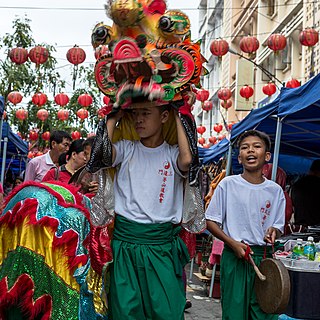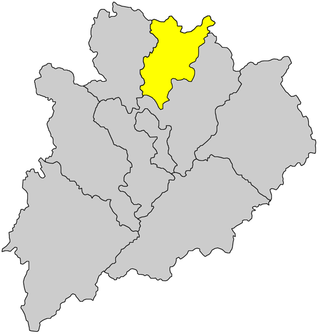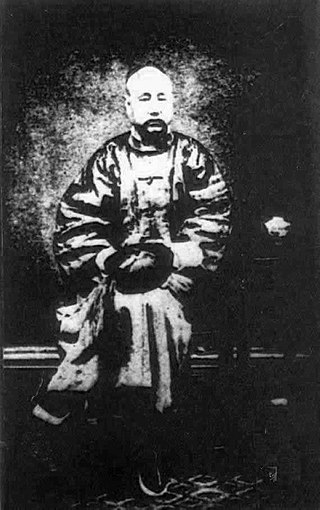This article relies largely or entirely on a single source .(October 2020) |
| |||||
| Decades: | |||||
|---|---|---|---|---|---|
| See also: | Other events of 1867 History of China • Timeline • Years | ||||
Events from the year 1867 in China .
This article relies largely or entirely on a single source .(October 2020) |
| |||||
| Decades: | |||||
|---|---|---|---|---|---|
| See also: | Other events of 1867 History of China • Timeline • Years | ||||
Events from the year 1867 in China .

The Taiping Rebellion, also known as the Taiping Civil War or the Taiping Revolution, was a massive civil war in China between the Manchu-led Qing dynasty and the Hakka-led Taiping Heavenly Kingdom. It lasted from 1850 until the fall of Tianjing in 1864, although the last rebel army was not wiped out until August 1871. The conflict resulted in approximately 20 million deaths. The established Qing government won decisively, although at great cost to its fiscal and political structure.

The Hakka, sometimes also referred to as Hakka Han, or Hakka Chinese, or Hakkas, are a Han Chinese subgroup whose ancestral homes are chiefly in the Hakka-speaking provincial areas of Guangdong, Fujian, Jiangxi, Guangxi, Sichuan, Hunan, Zhejiang, Hainan, and Guizhou in China, as well as in Taoyuan City, Hsinchu County, Miaoli County, Pingtung County, and Kaohsiung City in Taiwan. The Chinese characters for Hakka literally mean "guest families". Unlike other Han Chinese subgroups, the Hakkas are not named after a geographical region, e.g. a province, county or city, in China. The word Hakka or "guest families" is Cantonese in origin and originally refers to the Northern Chinese migrants fleeing social unrest, upheaval and invasions in northern parts of China during the Qing dynasty who then sought sanctuary in the Cantonese provinces such as Guangdong and Guangxi, thus the original meaning of the word implies that they are guests living in the Cantonese provinces. Over the centuries, they have since more or less assimilated with the Cantonese people. Modern day Hakka are generally identified by both full Hakka and by different degrees of Hakka ancestry and usually speak Hakka Chinese.

The Xianfeng Emperor, or by temple name Emperor Wenzong of Qing (清文宗), given name Aisin-Gioro Yizhu (奕詝), was the eighth emperor of the Qing dynasty, and the seventh Qing emperor to rule over China proper, reigned from 1850 to 1861. During his reign, the Qing dynasty experienced several wars and rebellions including the Taiping Rebellion, Nian Rebellion, and Second Opium War. He was the last Chinese emperor to exercise sole power. After his death, the Qing government came under the control of Empress Dowager Cixi.

The Nian Rebellion was an armed uprising that took place in northern China from 1851 to 1868, contemporaneously with Taiping Rebellion (1851–1864) in South China. The rebellion failed to topple the Qing dynasty, but caused immense economic devastation and loss of life that became major long-term factors in the collapse of the Qing regime in the early 20th century.
The Punti–Hakka Clan Wars were a conflict between the Hakka and Cantonese people in Guangdong, China between 1855 and 1867. The wars were fierce around the Pearl River Delta, especially in Toi Shan of the Sze Yup counties. The wars resulted in roughly a million dead with many more fleeing for their lives.
Lai is a common Chinese surname that is pronounced similarly in both Mandarin and Hakka dialects. The meaning of the character used in the Lai (賴) surname is "depend on; trust in; rely on". Conversely the words, 无赖 literally translated to "without Lai" which means "undependable, rascal or scoundrel".

Jiaoling County is a county in the northeast of Guangdong Province, China, bordering Fujian province to the north. Under the jurisdiction of Meizhou City, it was previously known as the Zhenping County.

Sengge Rinchen or Senggelinqin was a Mongol nobleman and general who served under the Qing dynasty during the reigns of the Daoguang, Xianfeng and Tongzhi emperors. He is best known for his role at the Battle of Taku Forts and at the Battle of Baliqiao during the Second Opium War and his contributions in helping the Qing Empire suppress the Taiping and Nian rebellions.

The Lin Shuangwen rebellion occurred in 1787–1788 in Taiwan under the rule of the Qing dynasty. The rebellion was started by the rebel Lin Shuangwen and was pacified by the Qianlong Emperor. Lin Shuangwen was then executed.
Events from the year 1860 in China.
Events from the year 1861 in China.
Events from the year 1868 in China.
Events from the year 1857 in China.
Events from the year 1855 in China.
Events from the year 1862 in China.
Events from the year 1863 in China.
Events from the year 1864 in China.
Events from the year 1865 in China.
Events from the year 1866 in China.